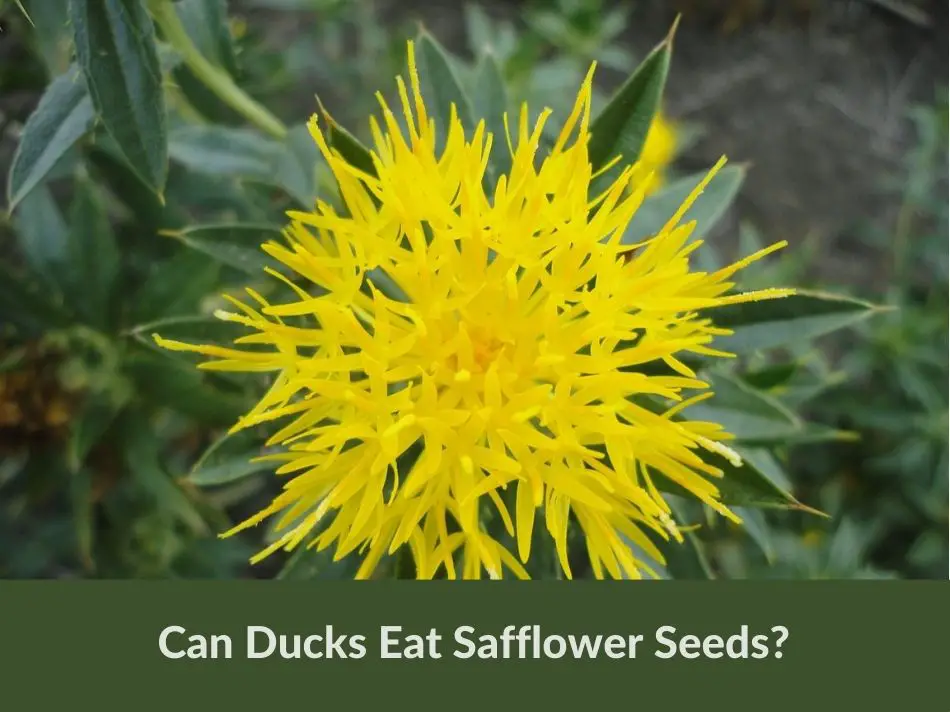Ducks are omnivores, meaning their diet consists of a mix of plants and small animals. In their natural habitat, ducks will feast on a variety of foods, ranging from aquatic plants, small fish, insects, and even small amphibians. Domestic ducks often eat pellets, grains, or seeds. But, can ducks eat safflower seeds?
Yes, ducks can eat safflower seeds. Safflower seeds are a great snack for ducks. They’re packed with essential nutrients that can be beneficial for their health.
In this article, we will delve into the topic of ducks eating safflower seeds. From understanding the general diet of ducks to the specific nutritional value of safflower seeds for our feathered friends to what manner these seeds should be fed to both adult ducks and ducklings.
How Often Can I Feed My Ducks Safflower Seeds?
While safflower seeds are nutrient-rich, they should be given in moderation. For a balanced diet, it’s recommended that safflower seeds be offered as a treat, making up no more than 10% of their overall diet. If you’re visiting a park or if you’re a caretaker, you might consider offering these seeds once or twice a week.
Can Ducklings Eat Safflower Seeds?
Ducklings have a different dietary requirement than adult ducks. While it’s safe for ducklings to consume safflower seeds, it’s crucial that these seeds are broken down into smaller pieces to prevent choking.
Their primary diet should still be duck starter feed which provides them with all the necessary nutrients for growth.
Safflower Seeds Nutritional Value
Below is the nutritional value of 100 grams of safflower seeds.
- Calories: 517 kcal
- Protein: 16.18 g
- Total Fat: 38.45 g
- Carbohydrates: 34.29 g
- Fiber: 6.0 g
- Sugars: 0.34 g
It also contains several vitamins and minerals as listed below.
- Vitamin C
- Vitamin D
- Iron
- Calcium
- Potassium
- Phosphorus
Are Safflower Seeds Healthy for Ducks?
Yes, safflower seeds are a healthy treat for ducks when given in moderation. They are rich in essential fatty acids, proteins, and other vital nutrients. Moreover, these seeds can be a source of energy, especially during colder months.
- Vitamin C: Essential for wound healing due to its role in collagen synthesis. Helps with iron absorption and boosts the immune system.
- Vitamin D: Facilitates absorption of calcium and phosphorus, ensuring strong bones and aiding in eggshell formation for laying ducks.
- Iron: Critical for forming hemoglobin which carries oxygen. Deficiencies can lead to anemia, resulting in lethargy and stunted growth.
- Calcium: Key for strong bone health and eggshell formation. Laying ducks especially benefit from adequate calcium to prevent brittle eggshells.
- Potassium: Maintains proper muscle and nerve function. Ensures efficient heart muscle performance.
- Phosphorus: Works with calcium for strong bones and teeth. Plays a role in metabolism, aiding in the growth and repair of cells.
How To Feed Safflower Seeds To Ducks
When feeding safflower seeds to ducks:
- Ensure the seeds are fresh and free from molds.
- For ducklings, break the seeds into smaller pieces.
- Scatter the seeds on the ground or in shallow water to encourage natural foraging behavior.
- Always make sure that ducks have access to clean water when feeding them. This helps them swallow and digest their food.
More Seeds Ducks Can Eat
Ducks are omnivorous creatures with a varied diet that includes not just aquatic plants and insects but also seeds. Seeds are beneficial for ducks as they provide essential nutrients and act as a source of energy.
Each of these seeds has its unique nutritional profile that can benefit ducks in various ways. Make sure to always provide fresh water when feeding seeds to ducks to aid in digestion
Discover what’s safe and nutritious for ducks with our thoroughly researched selection of grains and seeds.
Conclusion
Safflower seeds can be a nutritious treat for ducks when given in the right amounts. Caretakers and park visitors alike should be mindful of feeding ducks a balanced diet and ensuring they have access to clean water.
Over-relying on any single food source can lead to health issues, so always diversify the treats and foods you offer to these delightful birds.
Disclaimer: The information in this article is for informational purposes only. I'm not an expert or a veterinarian.


